Mass Effect 3 was already released in some regions. So it seems like I’m fashionably late writing about Mass Effect 2 at this point. But there is one last thing I really wanted to talk about before moving on. This time, I’m not going to go into the details of it’s interface design. Instead, I’m going to look at the details of it’s storytelling.
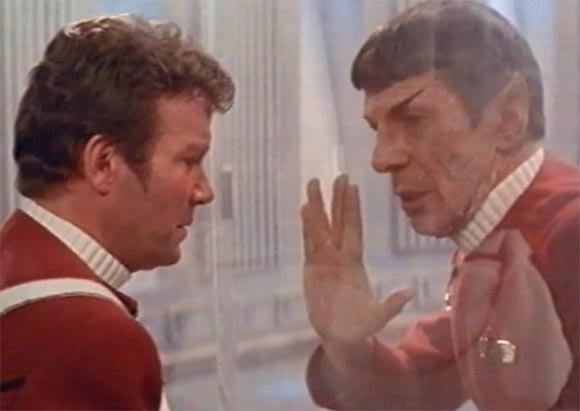
Bromance interrupted. So close yet so distant. Like gameplay and story.
It all comes back to this weird feeling of emptiness I was left with after finishing Mass Effect 2 for the first time. Somehow, the it felt like eating a few boxes of rice crackers. I was utterly stuffed on the one hand, but on the other hand, it didn’t seem to have much substance. Somehow, all the things I went trough rarely connected with me. Even during the game I found myself being slightly bored even though I was going through awesome environments fighting viscous enemies with laser guns and rockets. So let’s take a closer look and find out what the problem is.
Now, one huge issue of Mass Effect 2 is that the main plot actually doesn’t really hold together very well. That’s something others already covered in great detail. On my first playtrough I never consciously noticed that none of the things I do actually adds up on a grand scale. This could be because a thick glue of tropes and special effects is holding everything together. The story in Mass Effect 2 works mainly because most players desperately WANT it to work. But there is something else that irked me. Something not about the big picture but the little details. So I want to take a closer look at one level as an example how Mass Effect 2 fails to connect on the small scale.
Emotional Buttons
But before we get into the details, let’s talk quickly what “connecting” means and how to achieve it. Generally, it’s quite simple. We connect emotionally to things that we can relate to. If any given event is something we recognize as familiar or emotionally relateable, it starts affecting us.
As an example, let us imagine a scene, where a random person gets killed by another random person. Without any context, that’s rather a weak connection. We don’t know who those people are. The only thing that makes us care is that a person died. And being mortal ourselves, we understand that this is something horrible.

We connect with characters when we recognize ourselves in them. They don’t need to be even human, they just need to behave in a human way.
Storytellers can use this to make such scene connect even better. They can flesh out the persons involved, introduce details to open up possibilities of recognizing ourselves or people we know within the fictitious characters. If we are told that the victim is a father of two children, we may think about our own parents. Or perhaps we have children ourselves and imagine them growing up without father. Or perhaps we are told that it’s the murderer that is trying to save or avenge a loved one. In this case, we may start asking ourselves if we did the same if we were in his shoes.
Once the audience connects with some characters and events in the story, those connections may themselves become leverage to create even more emotional connection. Perhaps the we care about the victim because it’s a character that helped us many times previously.
With that being said, at the beginning of Mass Effect 2, there are two way in which the story can connect to players.
- The depiction of characters we can relate to as humans.
- Anything from Mass Effect 1.
As already mentioned above, the first one is universal. The second one is something only true for players, who already played Mass Effect 1. But those players care a VERY GREAT DEAL about anything form Mass Effect 1. After all, they spent up to 40 hours there.
Additionally, games are special because they work on the basis of responsibility and not just empathy. So the audience connects much greater to evens they have some agency in. This doesn’t necessarily have to be something drastic like being able to prevent the murder. If fact, that’s not that great because players may feel compelled min-max decisions. Things like being able to talk to the murderer, tend to the wounds of the victim, call the police, etc. can go a long way to establish a sense of agency already. A good example of that being the opening scene of Indigo Prophecy/Fahrenheit. Conversely, just having something play out without being able to react on it usually fails to do anything to us because we recognize it as something that was “meant to happen”. And that’s why many players dislike cut-scenes.
And of course, agency on a larger scale is harmony of gameplay and story. When story and gameplay tap into the same feelings and emotions, communicate the same ideas, we feel as if we actually drive the events of the game.
Lazarus Project
Let us dive into the analysis of the first level. The research station of Lazarus Project is one of the first levels in the game. It’s not the first time you control the main character in Mass Effect 2, but it’s the first time you are introduced to some of the game’s core mechanics. The level begins with a longer cut-scene showing Shepard being subjected to various medical procedures. At one point Shepard almost dies. We eventually see Shepard waking up in an anonymous operating room, visibly still not fully recovered from the procedure.
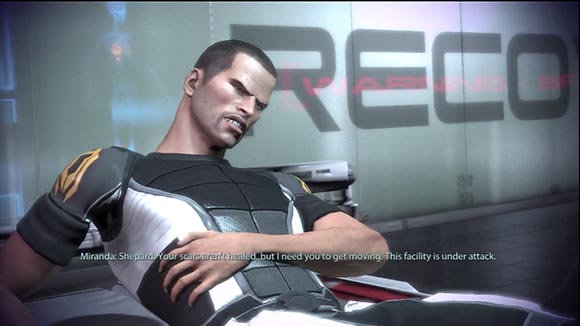
If you though the hangover from last weekend was bad, try being DEAD for 2 years.
This is good! Being hurt or sick is something everybody can relate to. Mass Effect 1 players connect especially because they already know Shepard and care about him. However, what happens next undermines everything:
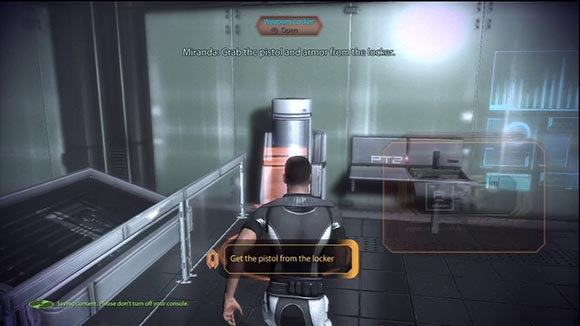
Apparently it’s just a flesh wound – Shepard is running around like new in a matter of seconds.
Shepard just gets up and as the player takes control, he can walk around freely just like that. There are no signs of any injuries. Shepard seems to be fully operational in a matter of seconds. What’s worse, we soon learn that Shepard was dead for two years and has been brought back to live. I’ve hurt my knee once and was in hospital for two weeks. Afterwards, I needed to re-learn how to walk. It was an agonizing, slow process. How am I supposed to emotionally feel that Shepard was DEAD for two years?
This is highly problematic on two other levels. First, it’s something that’s called Ludonarrative Dissonance – what we saw in the cut-scene is not something we can feel during gameplay. The cut-scene and the gameplay tell us different things. This drives a wedge between the two that lessens the impact of both. We care less about the cut-scenes because they seem to have less relevance to what we actually do in the game. We care less about the gameplay because it probably won’t affect the story that much.
The second problem is something I mentioned above. We fail to connect to the story also because we can’t act it out, we have no agency in it. We can’t act out being hurt. We can’t affect the recovery. It’s something that somebody else decided for us and has taken care of in advance.
How to fix this: Shepard’s state should be visible in the game and players should have some way to react upon it. Shepard’s animations could show him limping, something that the game does later in the sequence with Joker. There could be some additional effects like a shaky camera, something that happens later when you drink at a bar. Additionally, players could have to remove some medical devices like that one early scene in 28 Days Later. Perhaps there is some medicine you need to find and administer to yourself. Ideally, there would be a small character ark where Shepard slowly re-gains his former strength as he progresses through the level. The final challenge would be to perform something highly physical – like jumping across a chasm as a proof that he’s back on track. It would make the level feel as part of the story, not just as filler between cut-scenes.
But let’s move on. A disembodied voice is addressing Shepard and telling him to wake up and grab a weapon. Apparently, there is no time to explain because the facility we are in is under attack. We hear explosions and we see shots being fired outside of a window. So, we go to the big glowing marker and *CLICK* we are instantly in full N7 armor and pointing a gun at things.
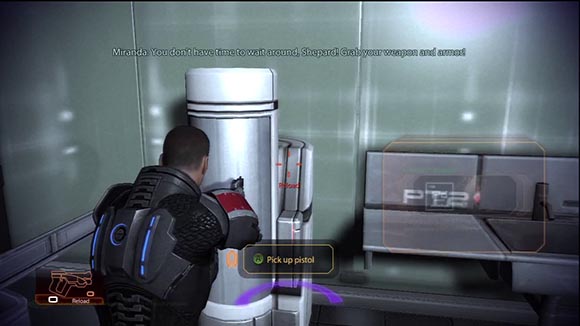
Every morning, I wish my girlfriend would get ready as quick as this.
To echo the previous point, in mere seconds, the game discards the entire backstory it took so long to introduce. Being able to walk around freely is one thing. Being completely ready for combat in just seconds after waking from a 2-year coma is extreme.
And why is Shepard wearing clothes anyway? Wouldn’t it be more relateable if he was in some kind of hospital gown? Who put on those clothes on and why? Did they know that Shepard would need to wake up soon? If they did, why didn’t they put on the N7 armor right away?
But there is more. The N7 armor is one of the iconic outfits of the series. Players of Mass Effect 1 recognize it well. Bioware even sells apparel with the N7 logo. The armor must mean a great deal for Shepard himself. He has been wearing it a lot. It probably saved him his life numerous times. And in once case, it even failed saving his life. Shepard should remember that he died wearing a similar armor before he woke up here.

If people pay 74$ for N7 hoodies, it suggests that this is important for them.
So donning the armor without even an animation is a gigantic missed opportunity to make Shepard appear more human and pay tribute to the events of Mass Effect 1. This could been a nice little moment where players can tell that all that we’ve been trough left a mark on Shepard. Because it certainly left a mark on the players. This moment should be meaningful and it just isn’t.
How to fix this: The moment of getting back into combat should be punctuated. Shepard could take a look at the armor and sigh. Perhaps it could be the same armor he died in and there is a hole reminding him he was dead. Or perhaps the door of the locker simply opens to reveal the armor like an old friend. Players could even participate in donning the armor. Either by an interactive animation like in Heavy Rain or at least by picking the armor in an equipment menu. Ideally, the armor should be signify something greater. It could be revealed much later. It could be something that Shepard finds and puts on at the end of the level as a sign that he has recovered.
Moving on, here is something a lot people had a problem with. Shepard notes that “This pistol doesn’t have a thermal clip”. The topic of thermal clips has been a contentious one for a lot of the Mass Effect 1 players. The problem being that weapons work differently in Mass Effect 2 than they did in Mass Effect 1. They now use ammunition – so-called “thermal clips”. Previously, weapons had infinite ammo and just had to cool down every now and then.
Personally, I don’t mind the thermal clips so much. They do a good job at forcing players to switch weapons. But I do feel like they could have been introduced more carefully. Like in this moment for example.
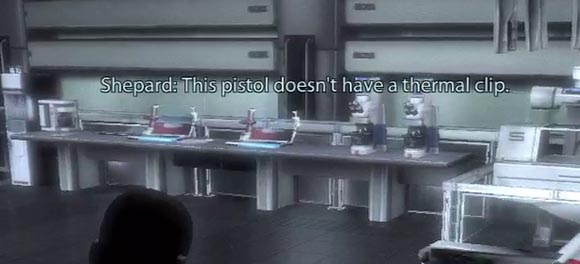
Shepard is a thermal clip apologist on the Bioware forums.
Shepard seems to know what a thermal clip is. This effectively disconnects players of Mass Effect 1 with Shepard. He knows something they don’t. It suggests that this is a different, unfamiliar Shepard. This is not the Shepard they have an investment in.
Additionally, the change from the old weapons to the new ones is not something that has been felt or experienced by players. It’s not something they acted out or have any agency in. It’s a decision that is being forced upon them. So of course, many don’t relate.
How to fix this: The simplest fix would be if Shepard himself would be surprised about the concept of thermal clips. An even better solution would be to act out the change. Players could start with an old, infinite ammo weapon. It could soon turn out to be ineffective against the new enemies. Players would then feel compelled to discard it in favor of a new weapon that uses thermal clips and has more oomph. This would make the transition into something players have agency in and smooth it out so there is no disconnect.
All of the above things happen in short succession. Let finally fast-forward a bit. There is a tutorial explaining how to hide behind cover. You do it to shield yourself against an explosion. This is good, although the reasons for the explosion are hazy. Next we get a thermal clip, learn to reload, learn to vault over objects, we finally meet our first enemy.
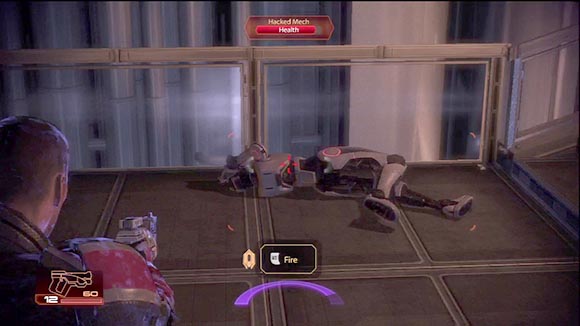
Geez! The robots in The Phantom Menace were more dangerous.
It is a robot and we fight it in a direct confrontation. Again, this doesn’t seem to reflect what the story is trying to tell. We have been told that someone is trying to kill us. We have been told, the attack is dangerous because it threatens the entire facility and all of it’s staff. We are still injured and and in an unfamiliar environment. Fighting our way right trough the attackers undermines everything we have been told so far. The first confrontation turns out to be a single, rather flimsy robot we can dispose of easily. In fact, it soon turns out we can overcome larger groups of those robots. So we are actually in no danger. It’s just a shooting gallery of some wobbly robots. Indeed, throughout the entire level, there is never a situation where we are overwhelmed by the attackers. There is some flanking and that’s good. But all of the waves can be eventually disposed of and we can safely move on. We never need to hide or retreat.
On top of that, robots are a bit of a poor choice so early on because they are not human. So as humans, we have a hard time connecting with them. Robots have no motivation, no goals. They blindly follow their programming. We can’t hold a robot at gunpoint and interrogate them to find out what they are after.
How to fix this: Actual combat situations should have been more about holding enemies off while you retreat. At least at the beginning, the gameplay should have been more about evading conflict rather than attacking head-on. Players could be required to use cover to sneak past an overwhelming army. This would help establishing Shepard as being in a vulnerable position and in danger. It would have also been an opportunity to listen in on conversations (robots repeating orders they receive) to communicate their motivation more clearly. Ideally, the robots should have been probably replaced by a more human enemy. Perhaps a group of mercs led by a charismatic leader. There could be a scene where Shepard hides in a safe place and watches as the Mercs demolish the room he woke up in as they search for him. This would make the level an actual story you act out and not just a shooting gallery in-between cut-scenes.
Eventually, we move on and see a huge mech killing the staff on the other side of a window. There is a similar scene like this later on. This is good because we see evidence that we are in danger.
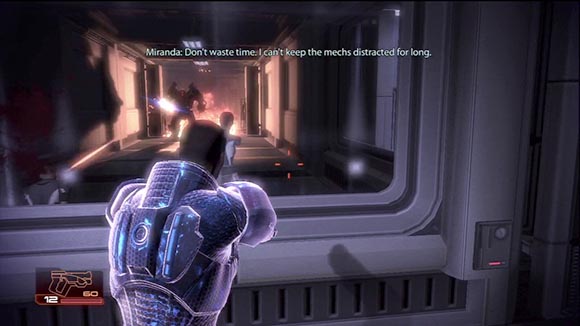
It’s like the Spock scene above. Only with a lethal, giant robot instead of Spock.
Sadly, this is actually nothing we can interact with. There is no way for us to help those people. Conversely, the events on the other side of the window don’t have tangible consequences for us either. So as noted at the beginning, it falls a bit flat since we don’t have any agency in it.
How to fix this: The simplest way would be to make the Mech break the window and shoot at you if you wait too long. A more complex solution would be a button you can press to open or close some door or turn on some sprinklers for distraction. This doesn’t necessarily need to save the robot’s victims. Just having some agency in that scene wold help. At least, you could perhaps re-visit this corridor later from the other side and find out something about the people, who died here. Ideally, you would exchange some words with them before they get attacked so they are not just some anonymous red shirts.
Next up, there is a tutorial explaining how to use a heavy weapon. You blast away a larger group mechs on a walkway beneath you. It feels awesome!
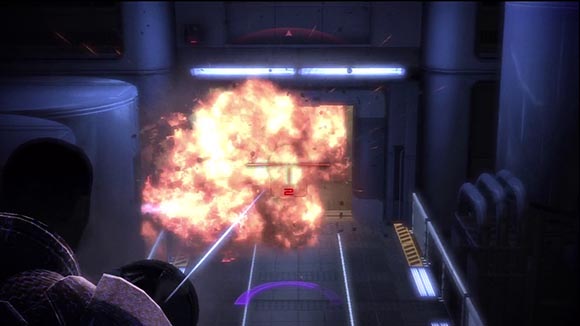
WOOOT!! Um.. I mean. Um… Darn, I’m danger… and stuff.
But again, this is perhaps the worst time to introduce a powerful weapon. Somebody is out to get Shepard. Shepard just woke up from being dead for 2 years. His wounds aren’t healed yet. This wouldn’t be the time to indulge in power fantasies. Shepard should feel vulnerable and overwhelmed but the gameplay communicates the very opposite.
How to fix this: Introduce the heavy weapon later. This would have been a great tool for the big finale of this level – or even for the next level when you actually fight the huge mech.
Next, Shepard needs to run trough some open fire. This is good because Shepard should be running anyway. It also puts Shepard in a position where he needs to actively escape harm – which is what the story tells us to do. A precious instance of story and gameplay synchronicity.
But it soon ends as get into some rooms where there are mechs crawling on the floor away from Shepard. Again, the Mechs do a good job at actually never really appearing dangerous. But the most important thing is that we can now explore the rooms. We are in some sort of an office and we can listen to some audio longs and hack some wall safes for extra money.
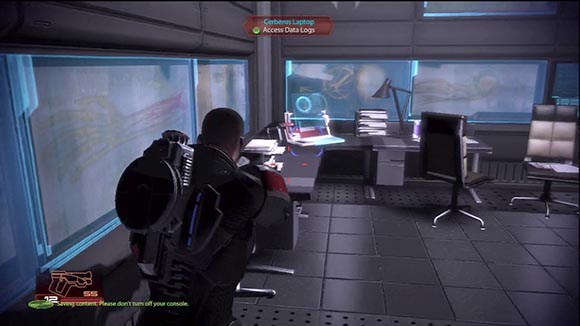
I’m Commander Shepard and I need to escape this lethal situation… right after I listen to this audiolog… and hack this wallsafe.
In some way, this is neat because at this point, we are starving for some kind of background information. We don’t know what this base is, who works here, how they revived Shepard and why. The audio logs help filling in some blanks and are a nice break from the fighting.
But on the other hand, isn’t this the WORST possible situations to explore the environment? Haven’t we been told that we need to get to the rescue shuttle? Isn’t there is a siren wailing and explosions going off? To add insult to injury, you can’t take the audio logs with you. You actually need to stay in the room and listen to them. There are two and you can only listen to one of them at a time.
Here is a mind game. Imagine that the entire backstory was different and the Mechs are actually a skeleton crew defending the base. Imagine Shepard is part of an elite group attacking the base and looking for some information. Amazingly, the gameplay fits much better to this description. Clearly, the narrative and the gameplay are almost entirely unrelated.
How to fix this: Informing the player is good but not if it undermines the point of the story. Shepard shouldn’t be distracted from his main task of escaping. Otherwise, the depicted life-and-death situation appears disingenuous. An audiolog could play in the background while Shepard hides behind a wall, waiting for an army of mechs to walk by. Alternatively, the audiologs could have been portable so you could play them while continuing through the level. Searching a room for extra loot is ok, but there should be a sense of urgency. For example, there could be a timer where you have only a limited amount of time to grab as much as you can and get out quickly.
After yet another scene where a Mech kills a person behind a window, we get to a bridge and meet Jacob. He is fighting off robots. This is good because we finally get to meet another person we can talk to. Jacob seems to be in a similar situation as we are, so we are instantly on his side. He is surprised to see Shepard and after killing of a wave of robots, we cower we cower behind the cover with him to have a chat. The chat is a bit too detailed for the kind of emergency we are in. But it certainly feels more dramatic than sitting in an office and listening to audiologs. Jacob even takes shots between some questions. We get to learn about some burning topics such as where we are, what the mechs want.
There is another wave which we participate in. This is also works as a tutorial to try out some biotic powers. Then there is an even more detailed chat afterwards where we even can ask for the whereabouts of our crew – a topic Mass Effect 1 players are invested in.
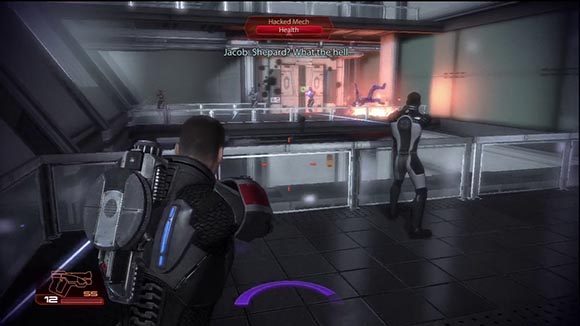
Jacob’s equivalent of Obi Wan Kenobi must have been just killed on the other side of this ledge. I see no other reason for him to stay here and shoot at the robots.
The problem here is that like the heavy weapon previously, the biotic powers are something that empowers the player. In this situation, they are used in an offensive way too. The robots are on a ledge across a chasm. There is no way they can reach Jacob and Shepard. It feels odd because Shepard and Jacob could have just walked away if they really wanted to escape. Finishing off all the robots doesn’t really feel defensive.
How to fix this: Robots should have been more of a threat. There should have been a walkway to the position where Shepard and Jacob are. Additionally, there should have been a way for Jacob to use his powers defensively. He could have used lift to collapse a bridge – something that emphasizes the fact that they are fighting off an overwhelming force.
The conversation is interrupted by Wilson. He is the subject of multiple audiologs. He is introduced as one of the scientists and somebody, who frequently argues with Miranda – a second scientist here. Wilson is surprised that Shepard is still alive and asks for help. Shepard and Jacob decide to rescue him.Wilson stays in contact over radio and it’s clear that he is in distress. Nevertheless, the game still offers opportunities to stray from the direct path to listen to some audiologs! Like previously, this actively undermines the seriousness of Wilson’s situation. It also teaches players to generally disregard what NPC’s are saying.
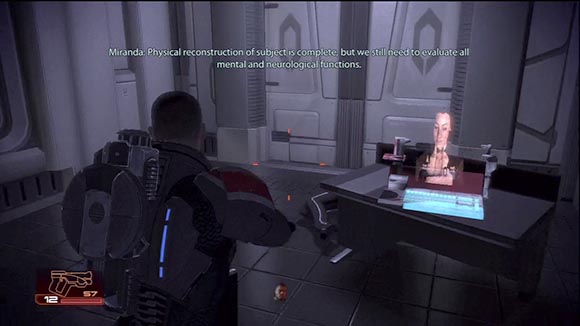
Hang on Wilson, I REALLY need to listen to this audiolog right now.
Eventually, you get to Wilson. His character is immediately set up as not being trustworthy. He has an treacherous facial expression, complains a lot, acts defensive when asked what happened and the dialogue choices the game presents you with circle around the question of trust.
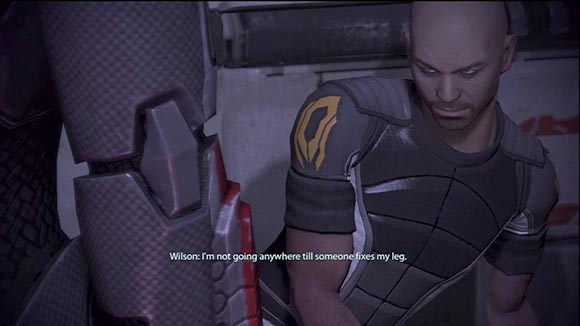
I don’t know, seems legit.
It’s obvious that he is up to no good. This would work well in a movie or a book. But as explained in another article, in a game this lessens the impact of the eventual twist ending.
How to fix this: Wilson could have been probably more likeable. Questions of whether trust him or not shouldn’t come up when you meet him, they should come up at the end of the level when you had time to make up an opinion. Until then, the game could have dropped some clues and set up alternative suspects for a final confrontation. The way it is set up right now, the player never really has a choice.
The Wilson scene is used as an opportunity for a tutorial about the use of Medi-Gel. Wilson needs to be healed by collecting Medi-Gel and using the Unity ability. This is a good idea because it lets you interact with characters in different ways than just by shooting or talking.
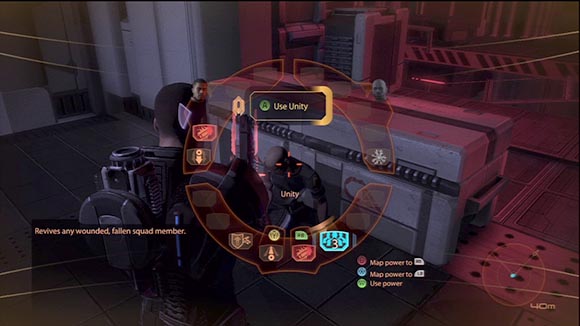
Medi-Gel – I don’t think it does what you want me believe it does… At least not anymore.
My only gripe is that later in the game, the Unity ability can be only used to revive characters, not to heal them. This is a huge departure from how Medi-Gel worked in Mass Effect 1, too. So being fuzzy about it during the tutorial is a bit confusing.
How to fix this: Wilson could be unconscious when you meet him. Before you heal him, he doesn’t say anything that Jacob couldn’t have said. It would make the Medi-Gel tutorial more consistent with how it works in battle.
An attack by a group of mechs finally interrupts the conversation. Wilson suggests to use his Overload ability to make a stack of explosive barrels explode to clear the way and get rid of the mechs.
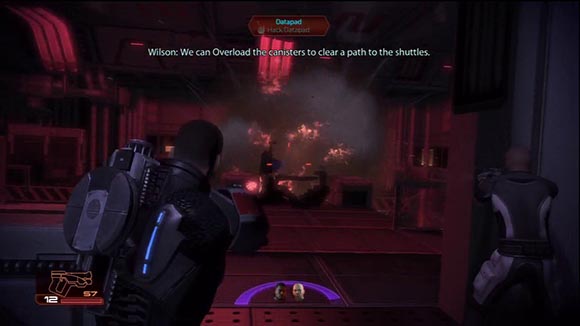
Wilson went to storm trooper school. He can’t decide if he want to open or close blast doors either.
This is a similar situation as with the heavy weapon and Jacob’s biotic powers. It’s an awesome display of power that crushes the opposition. It doesn’t feel defensive.
How to fix this: The overload ability could have been easily used in a defensive way – for example to block off an entrance to hold off enemies. This would have been more consistent with the story.
After the battle, Jacob confesses to Shepard that this is a Cerberus facility.
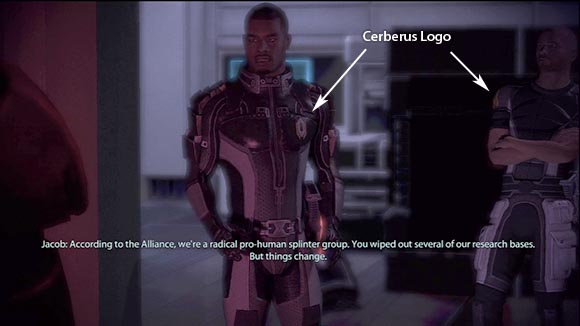
There is also yet another Cerberus logo on his back.
This should be a big deal because Cerberus were the bad guys in Mass Effect 1. But it’s hardly a surprise. I mean, the game has a function called “Cerberus Network” in it’s main menu. The facility you are in doesn’t seems to be especially secretive about it’s affiliation either. Jacob is actually wearing a uniform with a Cerberus logo on it. It could have been a cool reveal, but they blew it.
How to fix this: Jacob could wear something to hide the Cerberus logo. He could pull it off during this conversation to visually underline this reveal. Ideally, this should have happened at the final confrontation with Wilson. This would have really added the necessary ambiguity to vamp up the “who can I trust” dilemma. The way it is set up now, Jacob actually manages to put a friendly face on Cerberus. It betrays what happened in Mass Effect 1 and defuses any drama that should have been going on in Mass Effect 2.
So off you go, hacking some more datapads and wall safes. Killing a bunch of robots. Granted, the final confrontations do feel a bit more desperate as the level design opens up more by the end. But the gameplay never conveys the same level or emergency the story implies.
Finally, we meet Miranda. She immediately shoots Wilson, explaining that he was responsible for the attack. We can raise some concerns but eventually we have no choice but to let it slide. Miranda answers some final questions and suggests we should leave the station.
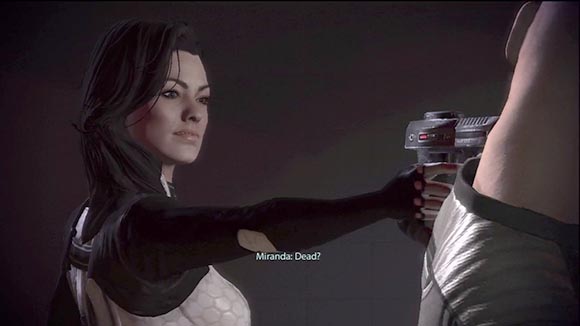
Personally, I think Miranda is a double agent secretly working for Bioware. She conveniently kills the villain so they don’t need to come up with a reasonable motif for him.
And so this is the big reveal and the reason for why you were supposed to run for your life for the last half an hour or so. Wilson sabotaged the project. Sadly, this makes no sense what so ever. Why would Wilson sabotage something he has been working of for two years? What was he trying to achieve? If he wanted to get rid of Shepard, he probably could have done so much sooner. Did he want to abduct Shepard? How are robots supposed to help with that, they tried to kill Shepard? Why was Wilson injured? He calls Jacob and Shepard for help so it seems to have been an accident, not even a ruse. Who was he working for? That question is NEVER actually picked up in the game. A half-sentence in one obscure log during one of the DLCs hints that he was an agent for the Shadow Broker. But we never actually engage the Shadow Broker during the main story of Mass Effect 2. The main plot is about something else altogether. So this whole chapter actually turns out to be a huge waste of time – a flimsy excuse to shoot at some robots.
Sadly, this impression is exactly what the gameplay communicates. There is never an attempt at actually telling a story of Shepard coming back to life or Wilson’s betrayal. The gameplay just goes straight to shooting robots in increasingly awesome way. Occasionally, you hack some data-pads or listen to audiologs for good measure.
How to fix this: It’s really hard to say where to start because it’s such a fundamental failure of interactive storytelling. There could have been multiple way of telling a story here. It could have been the story of Shepard slowly regaining his strength after the unbelievable medical miracle he has been trough. This would have probably meant reducing the combat in the early portions of the level. The level would end with some final, physical challenge like jumping on a leaving shuttle in the very last second. It could have been also a story of trust and betrayal. This would have meant fleshing out Wilson some more and setting up a final confrontation. Shepard would need to decide between Cerberus a former enemy who saved his life and another, unknown party that may or may not want him dead. Ideally, this first level should have set up the main conflict of the story. So the Lazarus Project shouldn’t have been invaded by generic robots in the first place. It should have been invaded by the Geth, the Collectors or any other party working for the Reapers. The Lazarus Project could have been stationed on a human colony in the process of being abducted by the collectors. Shepard could have been the only survivor because Collectors thought he was dead. This would connect perfectly with what your goal in the rest of the game is.
Summary
So in summation, just this one, short level exhibits are rather astonishing variety of diffident issues.
- Gameplay / story schism
- Sense of urgency is undermined by providing distractions
- Sense of vulnerability is undermined by indulging in power fantasies
- Motifs of enemies are never explained
- Level doesn’t tie into subsequent plot
- Misrepresentation of gameplay mechanics in the story.
- Missed opportunities for emotional binding
- Shepard doesn’t behave in a relateable way
- Disregard for the events of Mass Effect 1
- Agency issues
- Emotional moments weakened by lack of agency
- Agency undermined by foreshadowing
Many of the above issues are small and subtle. But they appear frequently and together they form a barrier that hold players back from emotionally connecting with most of the gameplay. As a result, they weaken the impact of the story too.
Porno Storytelling
At GDC Europe 2010, David Cage made an interesting point about how storytelling works in many games. He observed that it is often reminiscent of how it works in pornography. The story is only a flimsy excuse to get to the “action”. There is no storytelling during the lengthy “action” scenes. The “action” scenes don’t inform the story either. They exist only as a means to themselves.
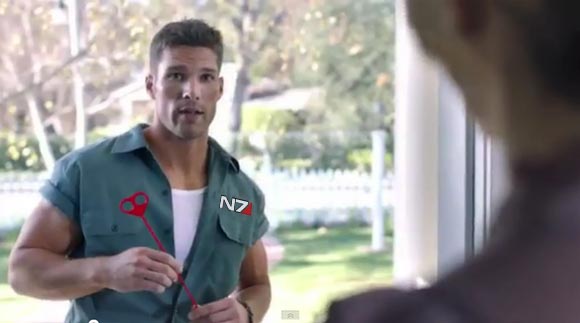
- “I’m here to clean the pipes.”
- “Well hello there! It’s right there on the other side of the anonymous warehouse behind the army of robots.”
*Boom-Chicka-Wah-Wah*
This describes well how most of the levels in Mass Effect 2 play out. The above example is by no means an exception. Even the most intriguing setup eventually boils down to going trough a linear level shooting at something. Chances for emotionally connecting with the audience are often forsaken. What’s even worse, many enemies you fight often turn out to be even less motivated than Wilson’s security robots. Here are some examples of missions with enemies in them, that contribute nothing to the story. They could just as well not exist or be replaced with a different type of enemy.
| Mission | What you set out to do | What it actually is | Why |
| Freedom’s Progress | Investigating an abducted colony | Shoot Robots | Misunderstanding / Panic |
| Jack’s Loyality | Re-visiting an abandoned lab | Shoot Mercs | They are there by coincidence |
| Mordin’s Recruitment | Curing a disease | Shoot Vorcha | Panic? |
| Derelict Reaper | Investigating a Reaper | Shoot Husks | Because Reaper |
| Tali’s Loyality | Defend her in court | Shoot Geth | Accident / Punishment |
| Thane Recruitment | Find Thane | Shoot Criminals | They just happen to be in the way |
| Grunt Recruitment | Find Krogan professor | Shoot Mercs | They are just there |
Out of the 25 missions or so, only 2 can be finished without going through a prolonged fight – Samara’s and Thane’s loyalty missions. Thane’s mission is especially remarkable because it’s close to Garrus’ loyalty mission – find somebody on the Citadel. Yet, unlike Garrus’ mission, Thane manages to avoid fighting hordes of enemies in anonymous warehouses.
It’s also worth to mention that of the 25 missions, 7 culminate in the place blowing up at the end. Sometimes it’s actually explained like in the case of Jack’s loyalty mission. Other times, there seems to be no good reason, like in the case of Legion’s loyalty mission.
But not all levels are just bad, of course. A positive example would be the Lair of the Shadow Broker DLC. In the first half of the mission, players investigate the disappearance of Liara, a character from Mass Effect 1. There is forensic investigation, rescue from the fallout of a terrorist attack, a car chase and a showdown at an exotic location. The villain has a clear motif and actually turns out to be very similar to the main character in some regards. It’s not a perfect mission but it avoids a lot of the problems mentioned above.
Conclusion
A well-designed game uses its mechanics to express ideas. Mass Effect 2 is very much a shooting game. So the shooting shouldn’t feel arbitrary and pointless. Players should feel connected to what is happening, not only because it feels cool, but because it actually means something. In a game that focuses on story and action, both should be tightly interwoven. The action should be informed by the story and the action should inform the story in return. Sadly, this is where Mass Effect 2 falls flat so repeatedly. The result is a general emotional disconnect. You go trough the levels. They look cool and the mechanics are polished. But at the end of the day, they rarely add up to anything else than a distracting postponement of the next cut-scene.
I observe developments like the “narrative mode” of Mass Effect 3 with some concern. It seems like instead of attacking the underlying problems, instead of even treating the symptoms, Bioware decided to actually cultivate them. In some ways, incidents like the attacks on Jennifer Hepler may be seen as a remote consequence of this schism. On the other hand, Lair of the Shadow Broker shows that they can do better. Mistakes such as the ones listed above are certainly something I will pay more attention to as I move on to Mass Effect 3.






Love these articles and agree with your points. There’s another example of weird player agency that you didn’t bring up that bothered me. It’s the part where after you meet Legion you’re crew gets abducted. This sets up a big, urgent rush to save your crew. I figured that, like the rest of the game, I had all the time in the world to continue with the story so I finished up some side missions before continuing. It turns out that while I was off doing the missions my crew was killed! There was no way to tell that this time the story and gameplay were actually connected.
Looking back it on it now it’s also an example of bad pacing. When I recruited Legion I had no idea there was only one more story mission left. Why would they introduce a new character right before the end? This means that if you wanted to use him you’ll be punished no matter what you do. Either:
-Use Legion on any side missions you have left without being aware that you’ll be punished for it.
-Wrap up the quests after the story, a severe letdown since you’ve already experienced the climax.
-Finish the quests before you meet Legion and only do his loyalty.
Besides just having him in my squad there are so many parts where I would’ve liked to take him to see how others would react, especially Tali’s loyalty, but it’s just not worth it.
Great point! I wanted to mention that but it didn’t really fit in the article.
Yeah, that’s really weird. I liked the fact that it mattered how much time you take to rescue the crew. But as you pointed out, it’s inconsistent with how other events are treated in the game. There are various emergencies in the game you can take your sweet time to deal with whenever you want without any penalty. They probably should have added some kind of timer to make clear that this is different.
And I completely agree. Legion felt very rushed because of it, even though he is a cool character. It’s the Hugh of Mass Effect, even including the virus dilemma! http://en.memory-alpha.org/wiki/Hugh
Wow, once again you deliver here. I have not read any of these things anywhere else. You give an extremely unique perspective. Two points I have:
1) They seemed to have more or less fixed the “first level escape” mission for ME3. I played the demo and I’m assuming it’s the beginning of the game. *SLIGHT SPOILERS AHEAD* The reapers are finally attacking Earth, and you actually have a sense of “Oh Damn, those things are actually huge and dangerous!” You have no way to stop them, you just have to run. I loved the little mini-story with the child, a cheap but effective emotional trick. This kid is a fan of Shepard (Normandy toy ship), Shepard meets him in a vent but can’t save him, then you think he’s going to get rescued and BAM! he’s blown up. What a great way to get the player pissed at the villains if they weren’t already. The entire story of the first 2 games involves trying to convince everyone of doomsday, and when it finally comes, the first thing I want to do is go right up to the council and say “I told you so you dumbasses. Now we’re screwed.” Great moment emotionally.
2) small thing, but unfortunately the Cerberus twist was never supposed to be surprising. If anyone who played ME2 watched even the smallest promotional material (trailers, interviews, promos), they pretty much knew it. I think it was more a marketing decision than anything. I remember the Illusive Man being shown and talked about at length, would have been much cooler if they never showed him until much later in the game, when you realize you were just following orders from someone you never saw until the end, and then the betray that you can make at the end would be that much more impactful. Unfortunately, you feel like you never really had a choice in his matters until that last moment. He never really had me personally convinced of his motives, he was painted as shady the whole time.
Great stuff keep it comin!
Hi,
Interesting read! Actually, I’ve got 2 articles you might find interesting written by some of the writers on my website: http://www.altergamer.com/ludonarrative-dissonance-call-of-duty-2/ and http://www.altergamer.com/breakin-down-mass-effects-commander-shepard/ . I see we our websites have fairly similar approach to games – if you guys want to cooperate some time in future, drop me a line!
BTW you could use some subscription options – rss, facebook, twitter etc. If you do, drop me a line, I’ll be the first one to subscribe (also option of logging in with your wordpress.org account would be great)
(also option of logging in with your wordpress.org account would be great)
Cheers,
Adam “Fanatyk” Wojciechowski
P.S. Nice to see fellow polish here
I know that this is not relevant with this article, but it’s really not clear where to post suggestions for an article, anyway I thought that you could do an article about Aquaria by Bit Blot, a game which I think is very well designed.
Really liked how you analyzed the opening level, spot-on, but the short critiques in the end don’t register quite as well. Maybe because they weren’t fleshed out or because you played the game too long ago and didn’t quite remember well
*Spoilers*
In Legion’s loyalty mission, you either blow up the heretic geth station or reprogram the geth present there with an EMP pulse. The choice is left to the player and is explained quite well. In fact, there are several dialogue interrupts while progressing through the level to give you more backstory and context to help you in making a decision. OK, the gameplay mechanic after the choice is “get the hell out of there ASAP” – but this didn’t feel unnatural given the circumstances.
* Mordin’s Recruitment – Curing a disease – Shoot Vorcha – Panic?
Actually no, during the mission you’re fighting through a slum-like district where a sickness is affecting any species except humans and vorcha. The vorcha, quite simple and opportunistic in their reasoning, see it as an opportunity to seize control and loot the district. Same behaviour humans exhibit during natural disasters (e.g. https://www.google.be/search?q=looting+hurricane+katrina )
* Derelict Reaper – Investigating a Reaper – Shoot Husks – Because Reaper
Again, no, the husks represent the Cerberus investigation team that was put there, indoctrinated and converted. Audio logs reveal that.
* Tali’s Loyality – Defend her in court – Shoot Geth – Accident / Punishment
Given the context, these are 2 seperate things put in one mission. It wouldn’t be unnatural for Tali to try and go save her father from a ship that is attacked by the Geth. Maybe it’s an unnatural tie-in with the actual defense, but the stories are connected – the fight should have happened first, only after which she would be court marshalled for being the possible cause.
* Thane Recruitment – Find Thane – Shoot Criminals – They just happen to be in the way
Mostly true, except in this case there’s a tie-in with ME1 – the person Thane’s ordered to kill is a mob boss you let go (or got away?) in the previous game.
Thank you for the reply, Eric. A most welcome well thought-out post in compassion to most of the reactions I get. The article is quite bit old so I had to refresh my memory of the game a bit in order to formulate a response.
Let me address the table. In general, I have no objections to your analysis. You are right, all encounters in the story do have a rational explanation. But while some of the explanations can be lengthy, they are not necessarily good. Like the above analysis of the Tutorial level, they fail to resonate emotionally as well as they could. Let me clarify.
My problem with the encounters is that
1. WHO you’re fighting and
2. WHY is mostly incidental and has barely any relevance to what you are actually doing.
So as for WHO – you could replace the identity of the enemies in many cases and nothing would change.
In case of Mordin’s Recruitment
- What if instead of Vorcha a band of Humans bandits tries to seize the control of the station.
- What if instead of Vorcha a Cerberus strike team was sent in to loot the place for valuable resources.
- What if instead of Vorcha a squad of robots controlled by a random NPC tried to take over the station.
In case of Derelict Reaper
- What if the Cerberus Team never got indoctrinated and you would be fighting Cerberus troops instead?
- What if the Cerberus Team never got indoctrinated and a band of Mercs attacked them and you just arrived as they were looting the place?
- What if the Cerberus team explored the Reaper remotely by robots and the Reaper assumed control of the robots killing everybody.
In case of Tali’s Loyality
- What if Tali was sending back Reaper parts instead of Geth parts and instead being overrun by the Geth, her Father’s team was indoctrinated by Reapers.
The answer to all those “What if” questions is that in most cases nothing would happen. The plot would work just as well. You would need to perhaps change some lines. Like from “Ceberus! What are they doing here?” to “Mercenaries! What they doing here?”
As for WHY – it’s true that each conflict has some explanation. But it often fails to tie into anything meaningful to the plot of fighting the Reapers. The problems that cause the conflicts could often have been easily resolved differently. This makes the explanations appear as flimsy excuse to shoot at people.
Mordin’s Recruitment – The Vorcha are looting the place? Why do you care? In fact, Shepard loots places all the time. Mordin could have just as well decided to leave with you the first time you meet him and nothing in the grand story of the Reaper war would have changed.
A better solution: What if the enemy you fight in the Tutorial were the Vorcha and not the Robots. During Mordin’s mission you discovered that the Vorcha looting the place belong to the same group. So by stopping the looting you would have also an opportunity to investigate who issued the attack on the Lazarus Station?
Tali’s Loyality – This is probably the worst offender in the “could have been just as well resolved differently” category. I was getting ready for a difficult TNG-Style diplomatic mission with a web of intrigue to untangle. Turns out it was just shoot Geth in the face again. Why is Tali put on Trial while the incident is still ongoing? I’m sure the Quarians have enough resources to liberate ONE science vessel. Why of all the people are YOU responsible? Wouldn’t a reasonable Judge ask an independent team to secure the evidence just in case Tali tries to tamper with it?
Better Solution: If the mission is about the a trial, it should be about the trial. Why of shoehorning a fire-fight into it? Make it the after-the-fact investigation a proper trial is supposed to be. Gather evidence, stalk people, overhear conversations. Perhaps somebody else screwed up and tries to blame Tali. Maybe somebody made a deal with the Collectors? Lair of the Shadow Broker and the more recent ME3 Leviathan DLC had some cool investigative parts. Thane Loyalty worked like that as well.
As for blowing up the Geth station – it maybe makes sense if you are trying to destroy the Geth. But why is the station exploding if you chose to pacify them? Why does the EMP pulse destroy the station? Doesn’t that just kill the very Geth you are actually pacifying? Blowing everything up is hardly a natural way to make peace.